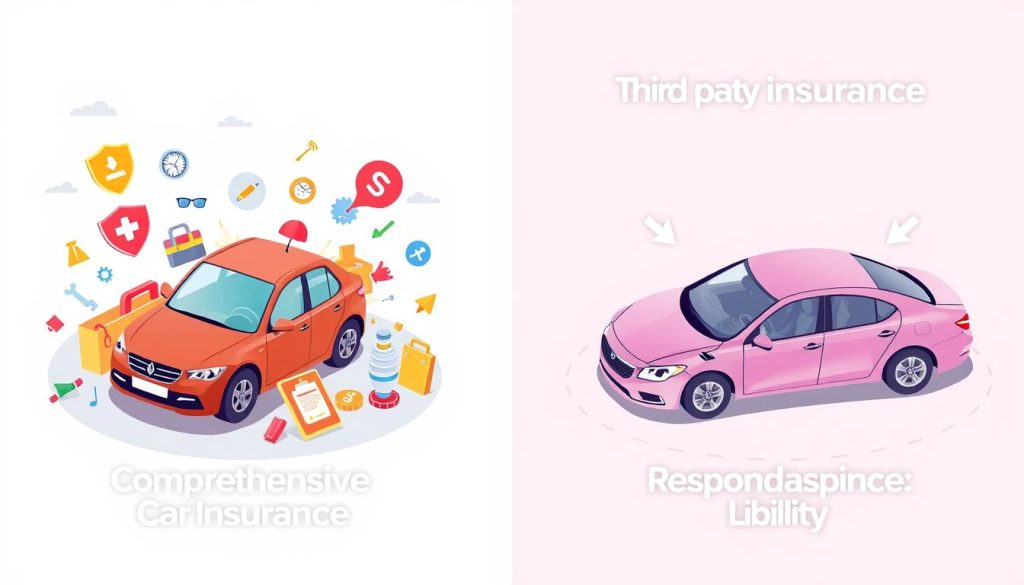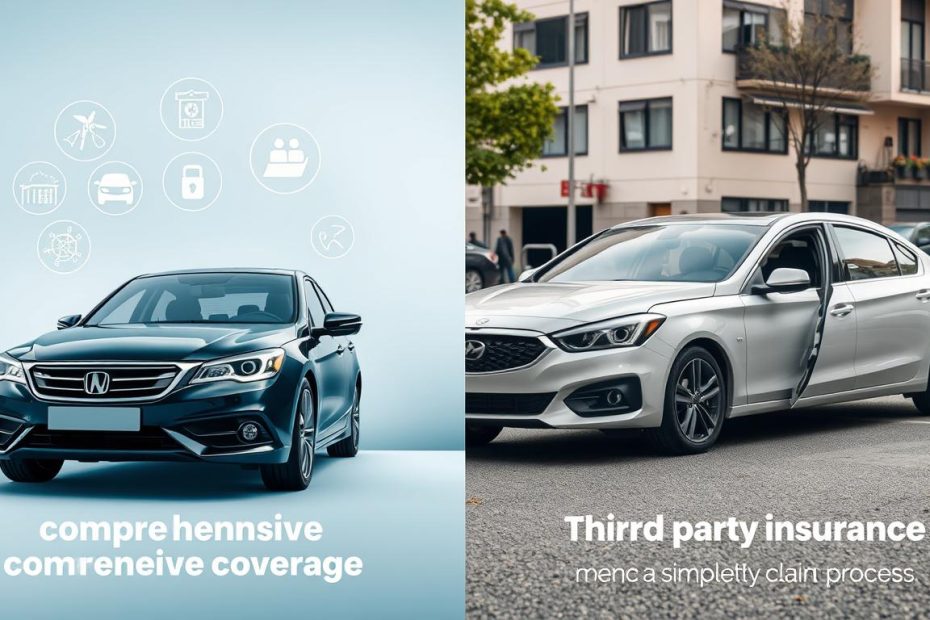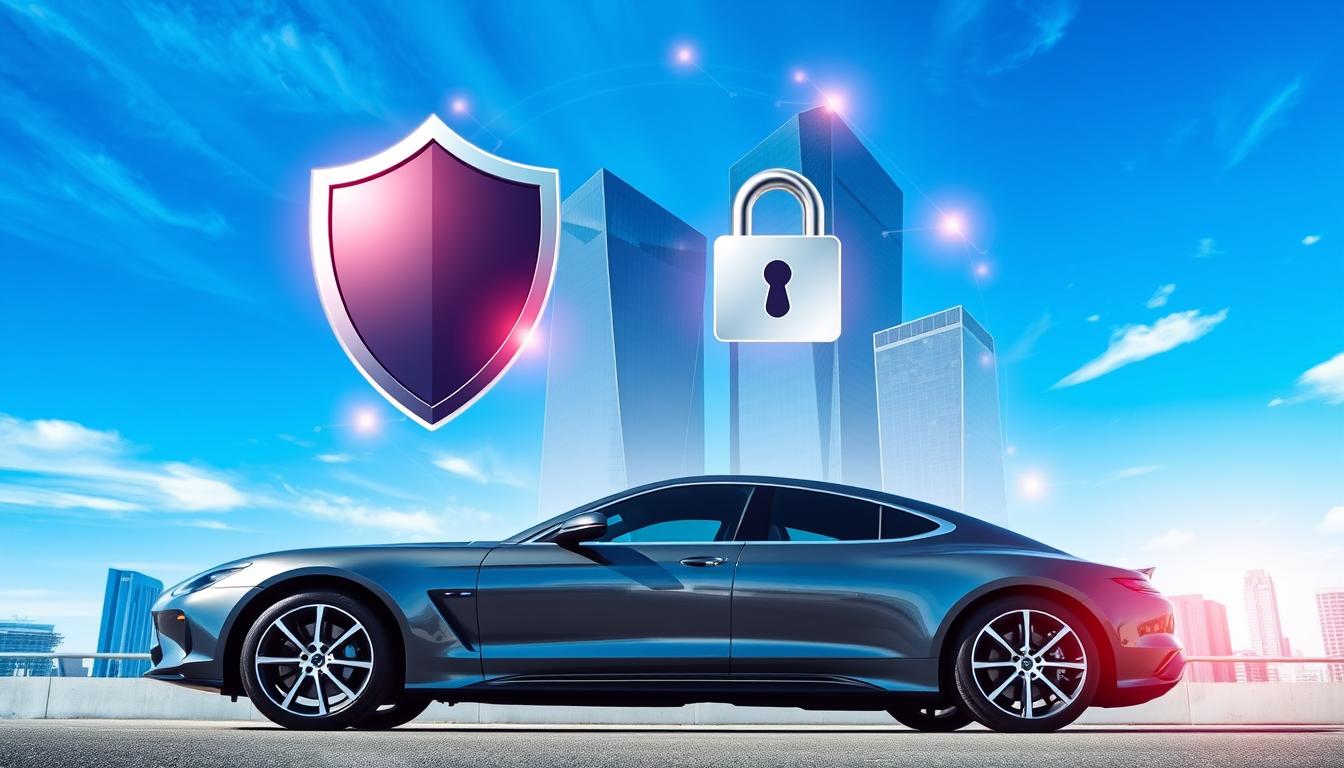Understanding the differences between car insurance and third-party insurance is key for anyone wanting to protect their vehicle and finances. Driving can be risky, and comparing insurance policies is essential. Last year, around 400,000 road accidents occurred in India, causing over 150,000 deaths and 350,000 injuries. Choosing the right vehicle insurance options can greatly impact your safety and well-being.
Third-party insurance protects you from the cost of damaging another person’s property, while comprehensive car insurance covers your vehicle too. Whether it’s an accident, theft, or natural calamity, the insurance you pick determines your readiness for such events.
In almost every state, carrying at least basic third-party insurance is required. This ensures you can cover costs if you accidentally harm someone else. However, comprehensive insurance offers more protection. Forbes Advisor India suggests picking comprehensive insurance for the best financial safety on the roads.
Understanding Basic Coverage: Third-Party Insurance
If you own a vehicle, you should know about third-party liability insurance. It’s a legal requirement for vehicle owners and acts as a key safety feature. It helps protect vehicle owners from the costs of damages or injuries they cause to others.
Legally Required for Vehicle Owners
Having third-party liability insurance isn’t just a good idea; it’s a law in many places. This rule shows the dangers of driving and how the law aims to protect people from financial harm. By meeting the legal requirements, drivers are ready to handle the responsibilities on the road.
Protection from Third-Party Claims
When accidents happen, third-party liability insurance becomes very important. It covers costs if someone else is injured or their property is damaged because of your vehicle. This insurance is key for keeping your finances safe after an accident.
What’s Covered Under Third-Party Liability
This insurance pays for injuries or death of other people and damage to their property. It does not cover your own vehicle or injuries. This way, it focuses on the harm done to others. Third-party liability insurance is a must-have for driving, protecting both individuals and the wider community.
Comprehensive Car Insurance: Beyond Basic Liability
Understanding auto insurance policies is very important. Comprehensive car insurance provides extensive coverage. It protects against third-party claims and damage to your vehicle. It’s perfect for those who want to feel secure while driving.
Covering Vehicle Damages and Loss
Comprehensive car insurance is valuable because it covers many risks. It helps with repairs or replacement after accidents, theft, or natural disasters. It even covers vandalism and riots, offering benefits that go beyond basic coverage. Yet, it doesn’t cover damage from breaking traffic rules or DUI.
The Role of Comprehensive Coverage in Accidents
After an accident, comprehensive car insurance really helps. It pays for your vehicle’s repairs and keeps your costs down. This policy acts as a safety net against sudden financial troubles after accidents. It’s a wise option for thorough coverage in your insurance plan.
Comprehensive car insurance provides peace of mind that basic liability doesn’t. It covers a wide range of issues drivers might face. This makes it an excellent choice for those seeking comprehensive protection while on the road.
Differences Between Car Insurance and Third-Party Insurance
Knowing the key differences between car insurance and third-party insurance helps you choose the best coverage. Third-party insurance is the basic kind required by law to cover damage or injuries your car causes. But comprehensive car insurance covers this plus damage to your car from theft or disasters.

Comprehensive car insurance offers a wider safety net. If a natural disaster damages your vehicle or if it’s stolen, this insurance typically covers the costs. Basic third-party plans don’t offer this level of protection. This makes comprehensive insurance better for those with more expensive cars or who live in places with lots of thefts or bad weather.
But there is more to insurance policy comparison than just what’s covered. The cost matters too; comprehensive car insurance usually costs more than third-party insurance. Since it covers more risks, the premiums are higher. For anyone with a new or pricey car, paying more for comprehensive insurance makes sense. It can save you money on repair or replacement costs later.
When it comes to making claims, there’s also a difference. Third-party insurance covers damages claims others make against you if you’re at fault in an accident. Comprehensive insurance, however, lets you claim for your own vehicle’s damage regardless of who’s at fault. This means you’re covered in more situations.
Choosing the right insurance policy needs careful thought about various factors. These include your car’s value, how you use it, and your own risk tolerance. A good understanding of these points ensures you get the financial protection and peace of mind you need. You’ll be better prepared for the unpredictability of the roads.
The Added Benefits: Comprehensive Coverage Enhancements
Looking into comprehensive car insurance means more than just basic coverage. It includes insurance coverage benefits that can be customized. You can choose optional add-ons for extended protection to fit your needs. These options widen your protection. They also make your insurance experience more personal.
Optional Add-Ons for Extended Protection
Optional features significantly improve comprehensive car insurance. Take Zero Depreciation Cover, for example. It prevents the claim amount from going down because of parts depreciation. This means you get more from your insurance if you need to make a claim. Then there’s Engine Protection. It covers engine damage, which standard policies usually don’t. This cover is vital if you face expensive repairs.
Understanding the Value of Add-On Covers
Add-on covers greatly enhance a basic policy. Roadside Assistance is one such option. It offers help like towing and flat tire changes. It can even provide emergency fuel. These services are crucial in unexpected situations. NCB Protection is another valuable add-on. It keeps your No Claim Bonus safe after making a claim. This gives you peace of mind.
Overall, optional add-ons for extended protection don’t just improve comprehensive car insurance. They also add to the insurance coverage benefits. This makes them invaluable for anyone seeking full insurance solutions. These solutions are customized to their needs and lifestyle.
Conclusion
Choosing the right coverage for your car is very important. Comparing insurance policies in detail is crucial. The difference between third-party and comprehensive insurance shows how well you’re protected. Third-party insurance is necessary. It covers damages to others and is a must for car owners. On the other hand, comprehensive insurance offers broad protection. It covers theft, natural disasters, and damage to your car.
Comprehensive insurance is more appealing because of its extras. It offers about 13 additional features not found in third-party insurance. These add-ons enhance your protection. As a result, comprehensive insurance costs more. But it gives greater value and peace of mind. Notably, insurers like TATA AIG provide over 7500 network garages. This makes cashless claims easy, highlighting the benefits of comprehensive insurance.
Comprehensive insurance premiums reflect your needs and your car’s value. In contrast, third-party insurance premiums are fixed. Looking at the big picture, comprehensive insurance seems costly at first. However, it prepares you financially better than third-party insurance. In the end, choosing insurance depends on how you assess risks, how you use your vehicle, and what coverage you want. Making a smart choice here strengthens your financial security on the road.


